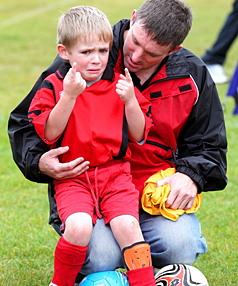A TON has been written about how parents might help their littles ones avoid common sources of stress – the first day of school, an upcoming performance, and the big game on Friday night. Most articles succumb to sage advice involving breathing techniques and an intentional focus on rehearsed tactical things that will make our little Mozart’s feel better prepared.
No advice that I can find writes about harnessing nerves into the drive to win the big game or into a performance that earns a first standing ovation.
I can find almost nothing where parents are told to have kids “run toward” the nervousness as a way for better preparing for future times of discomfort. From my seat, we need to start because, let’s face it, two parenting phenomena are happening simultaneously:
- Kids are more stressed out by new, non-virtual experiences that most of us parents might find normal (or trivial), and,
- There is little toleration for a “suck it up”, “rub some dirt on it” mentality that many of us experienced during our childhoods.
So, what do parents do when we detect anxiety in our kids? Or, when our kids bring up being anxious, how do we best prepare them to get through? Can we re-brand the “a” word (anxiety) as a performance enhancer?
I’ve been struggling with this over the last few weeks as my kids have repeatedly faced new, nerve-inducing situations at school and/or on their chosen fields of play.
Everett, my 11-year-old, talks about being “nervous” for everything. He’s nervous for soccer (games and practices), for classes to start, in trusting his ability to lock up his bike at school, and in almost every social situation he encounters from birthday parties to family bbq’s. He’s a ball of nerves all of the time and it feels like A LOT.
But, since he is a kid with a bunch of friends, good grades, and decent athletic ability (sorry for the humble bragging), I have tended to roll my eyes at these constant anxious thoughts.
He’ll get over it, right?
Predictably, dismissing his feelings hasn’t much helped them stop.
Then comes my youngest’s nerves. Emersyn, an 8-year-old third grader has taken “I’m scared” to another level – often avoiding any new situation that makes her, like her brother, “nervous.” She wants to participate in things, but tends to shy away from anything that she is unfamiliar with, or in situations where her level of immediate mastery is unknown or low. We are forced into making her do everything that she tells us she wants to in the first place – often fighting through her tears or pealing her off of our legs simply to try.
Again, my eye-rolling and dismissive looks haven’t helped.
As I try to figure out the right remedy, I do feel empowered by a few personal parenting absolutes. First, I will not allow these types of anxieties to create total avoidance. My kids must (at least) “try” things even if they are uncomfortable at first. Secondly, while I don’t think these situations are really a “big deal”, I have to acknowledge that they could be if handled poorly now. And, at minimum, they are to my kids at the moment. Third, dismissing a kid’s nerves as meaningless or not a big deal is a recipe to fail and a future trust-breaker.
From these absolutes, I am trying to help each of my kids through nervous situations in three steps.
Step #1: Identify the source specifically
Step #2: Name the possible outcomes
Step #3: Repurpose their energy toward the best outcome
((BTW: my wife is 100% better at all of this than I am))
For Everett, these stressful situations often work themselves down to unfounded thoughts that, when specifically named and recognized, he needs to mute. When he’s nervous for the next soccer match because “the other team is really good”, we’re trying to focus on the aspects of his game that might will help his team succeed.
In Emersyn’s case, she is not even thinking about outcomes, she just doesn’t feel comfortable attempting. We’ve tried to help her think of the best and worst outcomes and work backwards to harnessing her nervous energy into the courage required to take the field (or stage or uncomfortable initial step).
Man, I hope we’re doing the right thing.
As with many issues we attempt to get through in parenting, we may never have an idea that these techniques are successful because, of course, stresses will never stop as our kids grow up. Even worse, with each step forward, the stakes get higher, the penalties for poor choices mount, and the impacts of missteps are longer-lasting.
Watching my kids struggle with nerves is tough – as hard, it seems, as finding concrete ways to help them do so less often. There is no easy route, I’m afraid – no list of steps that work on each child, at each point of anxiety they encounter.
We need to be ready though. Our kids will be facing stressful life events and will need to respond. Will they run to or from their nerves? Can we help teach them to reframe stress into success? I think so.
Discomfort, stress, and anxiety, for me and my kids, has to be a precursor to growth, perseverance, and increased confidence. And, as importantly, I have to be resolutely committed to the idea that teaching them to avoid nerves or anxiety is only setting ourselves up for more, bigger, and worse down the road.
